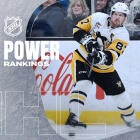Blue Line Buzz: Sound defensive strategies
Get your defensive house in order with Dan Pennucci's latest edition of Blue Line Buzz.
You have to wonder if the Montreal Police Department will look to formally charge Max Pacioretty with assault after Saturday's Rangers-Canadiens contest. Pacioretty boarded the Rangers' Ryan McDonagh in the second period of the Habs' 3-0 win, forcing McDonagh to leave the game. After all, dirty hits that happen in Montreal have ended up in courtrooms, as Pacioretty surely would remember having brought the phrase "stanchion" into the consciousness of hockey fans two seasons ago when he was hit by Zdeno Chara. Chara had charges filed against him, which were dropped, but the fact that charges were filed against him is a bit much.
The question remains as to when (or if) Pacioretty will be charged for hitting McDonagh. One would assume Pacioretty must have been charged for hitting Kris Letang last year as Chara was charged for hitting him. Pacioretty is a repeat offender and likely will be suspended for several games following Sunday's supplementary discipline hearing with Brendan Shanahan.
Pacioretty wasn't the only 30-goal scorer to dish out a questionable hit this past week, as Edmonton's Taylor Hall delivered a nasty knee-on-knee hit to Minnesota sparkplug Cal Clutterbuck on Thursday, earning him a two-game suspension.
In the United States, the NBC Sports Network is rebranding its Wednesday Night telecasts as Rivalry Night. The recent weeks have featured contests between Boston and Montreal, Philadelphia and Pittsburgh along with matchups between the Rangers and the Devils in the future. So far, there have not been too many reaches in terms of what they've called a rivalry, but they're hyping the matchups by using the mid-1990s punk alternative hit "Keep 'Em Separated" by The Offspring. Yes, 1994's smash hit about gang violence is being used by the NHL. (the clip is the second video on the page.)
Regarding Chara, the goal he scored Sunday in the first period against Florida featured a spin-o-rama followed by a top-shelf backhand finish. Probably one of the best parts of the clip is hearing Chara called a ballerinia by Bruins' play-by-play announcer Jack Edwards.
All Things Even: Examining even strength points
Most of the 60 minutes in any NHL contest is played at even strength. Five-on-Five, or four-on-four in some rarer situations. Understandably, most of the consideration for Fantasy hockey is focused on the power play, where, ideally at least, it is easier to score since one player from the other team is in the penalty box feeling shame.
In terms of blue liners, those that eat up power-play time and produce on the man-advantage are coveted by owners. It's a rare breed of defender that can make an impact both at even strength and on the power-play. Remember, Dan Boyle began his career in Florida as a power-play specialist in the early 2000's before he was shipped to Tampa Bay for essentially a bag of pucks. This season we are certainly seeing our share of defensemen whose points are concentrated on the power play, namely Andrei Markov of Montreal and New Jersey's Marek Zidlicky. One of those defensemen is more likely to produce a goal for their opponent than the team for whom they skate. (It's not Markov).
Markov has essentially disappeared in Montreal following a lightning-fast start. The market correction is understandable, but Markov has no points in eight games. Does it have to do with P.K. Subban's return to Montreal? Possibly. But Markov simply wasn't producing at even strength, and, of his 10 points on the season, not a single one has come at even strength. His slump, oddly, has coincided with Montreal's red-hot recent run of play.
Along the same lines, Zidlicky has been an utter and complete detriment to New Jersey's mission to stop other teams from scoring, but his six power play points will keep him in the team's lineup and likely on Fantasy owners' radars. No matter how bad Zidlicky is in his own end, he's opposite the point from Ilya Kovalchuk on the power play; a power play that also features one of the NHL's leaders in assists, Patrik Elias. Zidlicky is worth a look in deeper leagues, but if he is usurped by Andy Greene, Zidlicky is worthless to most owners.
Tampa Bay's Victor Hedman is starting to develop into the player the Lightning hoped he would become when they selected him second overall between John Tavares and Matt Duchene in 2009. Hedman continues to be a physical force for the Lightning and one of the cornerstones of the team's future along with Steven Stamkos. Hedman is playing 22:24 per contest and seeing significant power-play time but, of his nine points, Hedman has just one on the power play. That's not a negative.
He's making an impact at even strength with all four of his goals coming there despite ceding some of his power-play time to Sami Salo and Matt Carle. He's capitalizing on his even-strength ice time to get on the scoreboard, not simply relying on dishing the puck to Stamkos on the man-advantage. Hedman is also a plus-11 and tied with Carle for the team's scoring lead among defenders.
Simiarly, with the New York Rangers, Marc Staal is establishing himself as an outstanding two-way defender with nine points through 17 games, just two of which have come on the man-advantage. Staal will need to keep producing at even strength as the Rangers have several adept defensemen already on the power play in Michael Del Zotto, Dan Girardi and Ryan McDonagh. Ironically, it's Staal that leads all these Blueshirt blue liners in scoring and his nine points are scattered rather evenly over 17 games.
In Toronto, Dion Phaneuf is a lightning rod for criticism and praise; he's a mercurial personality with the potential to make a huge impact on a game, be it through hits or making plays. Of Phaneuf's nine points, seven are on the power play. While Phaneuf grabs the headlines, it's his teammate, Cody Franson that is making a substantial impact at even strength.
Through 16 games, Franson has 11 points with eight coming at even strength. Franson is making an impact in Toronto, capitalizing on the injury to Jake Gardiner while also chipping in occasionally on the power play.
True, Franson is likely long gone your league, but don't discount a defenseman entirely because of their lack of scoring on the power play. Elite defensemen like the St. Louis duo of Kevin Shattenkirk and Alex Pietrangelo, Kris Letang of Pittsburgh and Vancouver's Alexander Edler will get their points both even strength and on the power play; the trick is figuring out what you want to focus on given your league's scoring system. If your league counts plus-minus, consider that player with a strong rating there and decent even strength points over a power-play specialist like Zidlicky.
When examining a player for production at even strength, consider the caliber of the team's forwards and how many other defensemen are on the blue line to take potential points away. A crowded blue line isn't entirely a bad thing, just something of which to be vigilant.
A situation like the one in Edmonton where Justin Schultz has the monopoly on power-play time with a group of skilled forwards is the outlier. Teams that often have a pair of puck-movers capable of producing such as Phoenix (Oliver Ekman-Larsson and Keith Yandle) or the Islanders (Lubomir Visnovsky and Mark Streit) are safe bets for balanced production. A player like Travis Hamonic owns seven points on the season for the Islanders, despite being a minus-9 with the majority of his points at even strength. (Depending on your league's scoring system, Hamonic is an attractive player if your league rewards secondary statistics such as hits, penalty minutes and blocked shots).
More ice time does not always translate into more production, but examining situations like zone starts, the play-by-play reports at NHL.com, the time-on-ice reports, that have replaced the older shift charts, (which were an outstanding tool for owners to use), can help. The linked reports above are from Saturday's Colorado Avalanche-Los Angeles Kings game and require a bit of combing through data to figure out who else was on the ice, but they show the result of each play, be it a faceoff, penalty, shot or a goal.
Other notable defensemen producing at even strength that could have staying power include: Pittsburgh's Paul Martin (12 points), Anaheim's Francois Beauchemin (the NHL leader in plus-minus as well. Why can't the Leafs get players like Beauchemin?), Los Angeles's Slava Voynov (all seven at even strength), Boston's Dougie Hamilton (six of nine at even strength), Vancouver's Dan Hamuis (six of 10 at even strength).
Notes and Observations
Patrick Wiercioch could be seeing an expanded role in Ottawa with Erik Karlsson out for the season. Wiercioch is a relative unknown to most hockey fans outside of the nation's capital, but he's posted assists in each of Ottawa's last two games. Given, Ottawa is suffering mightily with Karlsson, Jason Spezza and Craig Anderson out of the lineup, but they will have to score goals occasionally. Wiercioch has six points on the season, all assists, but has been seeing an uptick in terms of power-play time, where four of his season's six assists have come.
His numbers during his junior and college career were not staggering in terms of points-per-game, with his best season being 35 points in 36 games while at the University of Denver. During the lockout, Wiercioch had an impressive 10 goals and 19 points for Binghamton in the AHL and is definitely worth a look in deeper leagues. Just remember that some of Ottawa's best scoring weapons are no longer there and Sergei Gonchar still will earn the most power-play time, despite having just one more point than Wiercioch.
Mike Weaver is not a player many Fantasy hockey owners clamor over. The Florida Panthers' blue liner has little track record of being a productive offensive player, but he's been quietly steady this season for the Panthers with five points in the last four games prior to Sunday's contest against Boston. Weaver has seven points on the season and is averaging a mere seven seconds of power-play time. Those seven points are as many combined as teammates Dmitry Kulikov and Filip Kuba and just two less than last year's runner-up in defenseman scoring, Brian Campbell.
Weaver will have to produce at even strength as he is usually relied upon more to stop the opposition than to create scoring chances. Weaver is not the player most poolies would have pegged to be second on the Panthers in terms of scoring from the back end, especially with Kulikov and Kuba on the roster. Most likely, Weaver's recent production is an aberration, but it's worth keeping an eye on if you're in need of assistance in deeper leagues.
Florida isn't the only Southeast division team whose defensemen scoring list appears slightly askew. While Carolina's top forwards are producing as one would expect, players like Eric Staal and Alexander Semin, it's Jay Harrison leading the charge from the blue line.
Jay Harrison. On a blue line with Joni Pitkanen, Justin Faulk, Jamie McBain and Joe Corvo, it's Harrison who has the team's scoring lead with seven points through 16 games, despite being a minus-7. Six of Harrison's seven points are at even strength. Given, he only has a one-point edge on Faulk, Corvo and Pitkanen, but it's interesting nonetheless.
Faulk has the highest upside of any defender in Raleigh, followed by McBain, but neither can do much to consistently produce. Faulk is mired in a four-game points slump while McBain could miss significant time according to the Raleigh News and Observer. Enter rookie Ryan Murphy, the player that had a forgettable game against the United States in Canada's semifinal loss at the World Junior Championships. Murphy has definite offensive potential, as he had put up 39 points in 46 games with the OHL's Kitchener Rangers. Murphy is a minus-4 through his first two NHL games but is definitely worth keeping an eye on if he shows some of the skill he can bring to a team's attack.















